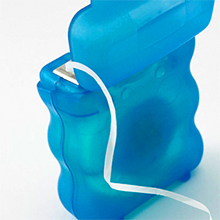Regular Floss Or A Waterpik?

An often asked question here at our orthodontic practice is whether or not to use regular string floss or a waterpik during daily oral care. Its true, flossing with braces can be quite difficult! So, let’s talk a little bit about the pros and cons of each.
The pros/cons of regular floss:
Dental floss is an effective and inexpensive way to keep your teeth and gums healthy. It is great at reaching those tight spaces in between your teeth, and it has the ability to scrape plaque off the sides of each individual tooth. This is important because it is able to remove the plaque before it can turn into tartar, helping prevent tooth decay and gingivitis.
However, for those of us with sensitive gums, flossing can be quite irritating and even cause bleeding. It is also less effective for patients with braces, as it is unable to penetrate the wires and reach the gums beneath.
The pros/cons of waterpiks:
Waterpiks are gentle on the gums and less likely to cause bleeding in people with sensitive teeth/gums. They are also ideal for patients with braces, as the water can reach behind the metal wires and flush away food particles where your floss can’t reach. People dealing with gum disease also find waterpiks quite effective because of their ability to flush out bacteria from inside the deep pockets that form when the gums pull away from the teeth.
On the other hand, waterpiks can’t remove plaque from teeth as well as floss can. Floss can scrape the sticky bacteria right off your teeth, but waterpiks just rinse it.
What’s the consensus? Waterpiks should not be used as a substitute for flossing. Though they are great tools for helping improve oral health, they are not a good enough tool on their own to keep your mouth gingivitis-free.
So, make sure you are brushing twice daily, flossing at night, and using your waterpik to reach the places that your floss can’t (like under the wires of your braces)!
Oh, and since plaque and tartar are nearly impossible to avoid completely, don’t forget to to get your bi-yearly checkups from your general dentist! Your oral health will thank you.
6 responses to “Regular Floss Or A Waterpik?”
Leave a Reply
You must be logged in to post a comment.



A study published in the Journal of Clinical Dentistry compared the efficacy of a water flosser to string floss used in combination with a manual toothbrush. The researchers found that the group who used the waterpik had a 74.4 percent reduction in plaque as compared to a 57.7 percent reduction in the group who used the string floss.
Other studies also found that people who used water picking saw a greater reduction in gingivitis and gum bleeding as compared with string floss.
I disagree. Waterpik flossing should be no less but better than string flossing alone. How do we get our teeth cleaned at our dentists? Definitely not by string flossing, but by dental equipment similar to waterpiks. And if they’re removing plaques then they’re not doing their jobs effectively. You of all dentists and orthodontists should know that.
And if they’re NOT* removing plaques…
(sorry for the typo)
Yes I came here to cite the same research as others. Multiple studies have shown a greater reduction in gingivitis and bleeding from water flossing than regular flossing, and that one often-cited article found greater plaque removal from water flossing as well. It is only one study, but I haven’t seen any studies that show the opposite. I have seen one or two that show equal plaque removal effectiveness. If water flossing alone is as good or better than string floss, which is what the current clinical research is showing us, then why do dentists continue to recommend the inferior method? My dentist told me I have zero plaque formation – like none – and I use an electric toothbrush and water flosser only. But she was aghast when I told her I no longer string floss. What clinical evidence is there that I would benefit from adding it back? And what issue are we trying to address if I have zero plaque on my teeth?
Water flossers are far superior to string floss. There are multiple attachments, including attachments for delivering antibacterial rinses deep into periodontal pockets, the variable water pressure allows the user to blast plaque right off their teeth and they are better at cleaning hard to reach spots in those with a less than perfect bite. String floss is good for cleaning the areas where teeth touch but that’s about it…and beware the gum ruining snap. Even hygienists seem unable to avoid it.
I’m a hygienist researching the benefits of waterpik versus dental floss. Would you be able to send me a view journal articles that shows the Waterpik as a higher standard of care.
Suzanne Morin
Winnipeg, MB
CANADA